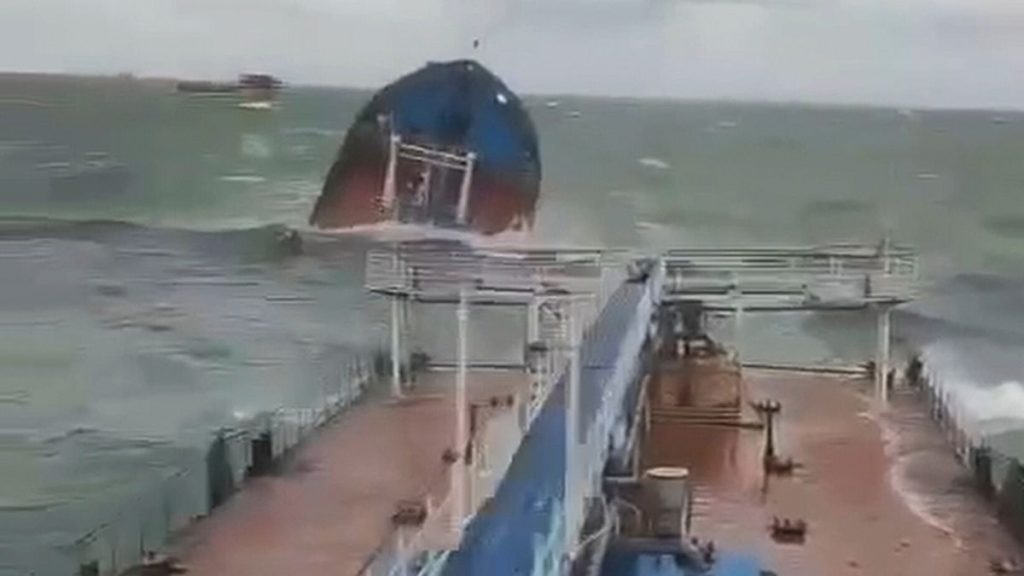The Kerch Strait, a vital maritime passage connecting the Sea of Azov to the Black Sea, witnessed a dramatic maritime incident on Sunday, August 20th, as two Russian oil tankers sustained severe damage amidst a raging storm. The incident involved the Volgoneft-212 and the Volgoneft-239, both carrying substantial amounts of fuel oil. The incident resulted in the tragic loss of one crew member, highlighting the inherent risks associated with maritime operations, particularly in challenging weather conditions. The Kerch Strait’s strategic importance as a shipping route, coupled with its history of geopolitical tensions, further amplifies the significance of this incident.
The Volgoneft-212, carrying 13 crew members, bore the brunt of the storm’s fury. The vessel ran aground, suffering a catastrophic structural failure that tore away its bow. This devastating damage led to the death of one crew member, while the remaining 12 were successfully rescued by emergency responders. The Volgoneft-239, also caught in the storm’s grip, sustained damage and was left adrift in the same vicinity, with its 14 crew members on board. The prompt response of the Russian Emergency Situations Ministry proved crucial in mitigating the potential for further loss of life.
The storm’s intensity played a pivotal role in the incident, exposing the vulnerability of vessels navigating the Kerch Strait’s often-turbulent waters. The strait’s geographical location, characterized by its narrow passage and susceptibility to strong winds and currents, renders it particularly susceptible to hazardous weather conditions. This incident underscores the crucial need for robust safety measures and stringent adherence to maritime regulations to mitigate the risks associated with navigating this strategically important waterway.
The incident involving the two tankers also highlights the potential for environmental consequences arising from such maritime accidents. Fuel oil spills pose a significant threat to the delicate marine ecosystem of the Kerch Strait, as well as the surrounding coastal areas. The extent of the oil spill and its long-term impact on the environment remain to be assessed. The incident serves as a stark reminder of the importance of proactive measures to prevent and mitigate oil spills, including robust vessel maintenance, enhanced crew training, and effective spill response strategies.
Beyond the immediate impact of the incident, the grounding of the Volgoneft-212 and the damage to the Volgoneft-239 underscore the broader geopolitical complexities surrounding the Kerch Strait. The strait’s location, separating the Russian-occupied Crimean Peninsula from mainland Russia, has been a focal point of contention between Russia and Ukraine since Russia’s annexation of Crimea in 2014. The incident highlights the vulnerability of shipping in the region to both natural disasters and geopolitical tensions, further complicating the movement of goods and resources through this crucial waterway.
The incident in the Kerch Strait serves as a multifaceted case study, encompassing the challenges of maritime safety, the potential for environmental damage, and the interplay of geopolitics in a strategically sensitive region. The tragic loss of a crew member underscores the human cost of maritime accidents, while the damage to the two tankers and the resulting oil spill highlight the environmental risks inherent in such incidents. The incident’s occurrence in the politically charged context of the Kerch Strait further underscores the complex interplay of factors that can contribute to maritime incidents and their broader consequences. This incident serves as a stark reminder of the need for international cooperation, stringent safety regulations, and proactive measures to mitigate risks in this critical maritime passage.














